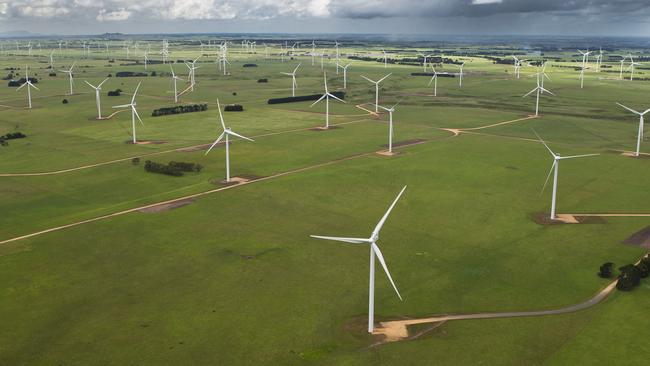While Coalition dithers on climate, world moves ahead


We have known a long time that the Earth is warming because of carbon emissions, becoming hotter and drier, that sea levels are rising, and we are experiencing more extreme weather events. This presents a threat to our economy, health, water and food security, biosecurity and natural environment. It is the most significant challenge of our time. We know because the leading scientific agencies, including Australia’s CSIRO, have studied the changing planet for decades.
While we can debate the long-term impacts of climate change, and evaluate the most efficient and effective policy response, there can be no denying that climate change is real and we must act. All governments accept that climate change is an economic, social and environmental challenge. State governments, whether led by Liberal or Labor premiers, support the goal of net-zero emissions by 2050. They each have frameworks, laws, regulations and policies to address climate change.
But the federal government, led by Scott Morrison, lacks a firm 2050 target and a coherent strategy for dealing with climate change. There are a mix of regulatory frameworks and a range of policies but no long-term plan with benchmarks, reporting and goals to track progress.
The Morrison government has committed to reduce emissions by 26-28 per cent on 2005 levels by 2030, which it says it is on track to exceed. This target is likely to be increased, and a 2050 net-zero target adopted, ahead of the UN Climate Change Conference in Glasgow this month. But it is not yet at this inevitable point.
While the Coalition dithers and delays, governments here and overseas are setting more ambitious targets.
The NSW government has set a 50 per cent emissions reduction target below 2005 levels by 2030. Victoria and South Australia have similar targets.
This week and next will be make or break for the Prime Minister on climate change. “Addressing climate change is a challenge that we must do together,” he said on Monday. “The world is moving into a new energy economy.”
Josh Frydenberg recently warned about the global capital market risk if Australia does not transition its economy. These are encouraging statements.
The Nationals – long out of step with rural and regional lobby groups and mining, manufacturing and farming industries on climate change – cannot be allowed to hold the government to ransom. The political reality, though, is that Morrison will have to make concessions if they are to sign-up to a more ambitious emissions reduction strategy.
But the other side of the Coalition ledger is equally important for Morrison. The Liberal Party has several MPs in wealthy progressive electorates in Sydney and Melbourne who know the government must go to the next election with a more credible climate change strategy or risk losing their seats to independents.
It is easy to attack the Morrison government on climate change. But the truth is that Liberals, Nationals, Labor, Greens and One Nation have repeatedly failed to act or backflipped on their policies. We have seen opposition leaders and prime ministers felled over climate change as it became a political cudgel.
In 1990 and 1993, Andrew Peacock and John Hewson respectively pledged the Liberal Party to reduce emissions by 20 per cent by 2000. John Howard promised an emissions trading scheme in 2007. Malcolm Turnbull in parliament and Tony Abbott in a column on this page both supported Kevin Rudd’s carbon pollution reduction scheme in 2009.
Abbott campaigned against Julia Gillard’s carbon tax but introduced his own “direct action” policy and signed Australia up to the Paris Agreement. Turnbull’s National Energy Guarantee became a farce when he dumped a promise to legislate emissions reduction targets. Morrison dumped the NEG even though it was Coalition policy.
Rudd walked away from his CPRS after failing to get parliamentary support, in 2010. Gillard pledged not to introduce a carbon tax but then introduced a fixed carbon price, which she accepted was a carbon tax. Rudd abandoned Labor’s carbon tax in 2013. Anthony Albanese described Bill Shorten’s 45 per cent emissions reduction target by 2030 as a mistake. Labor still does not have a detailed, costed plan with 2030 targets to reduce emissions.
One Nation is a party of crackpot conspiracy theorists who absurdly deny climate change while the Greens have zero credibility given they voted with the Coalition to defeat Rudd’s CPRS, which could have seen Australia lead the world on climate policy.
The Business Council of Australia backs a 46-50 per cent cut in emissions by 2030 and net-zero emissions by 2050. Is this a joke? Three years ago the BCA said Labor’s 45 per cent by 2030 target was “economy wrecking”. It now advocates a bolder target and claims “facts have changed”. This is ridiculous; nothing has changed. Australia’s biggest companies, including large emitters, have been ahead of the BCA on climate change for decades.
Finally, many of Australia’s green groups and environmental prophets have not helped their cause with alarmist predictions based on flawed modelling. Claims that Australia’s largest cities soon would be underwater, our dams would be empty, that we faced a mass species extinction in our lifetimes and it was too late to save the planet from cataclysm only energised climate denialism.
Climate change is probably the greatest collective failure across the political spectrum in Australian history. We need to continue to facilitate the take-up of renewables (solar and wind) and boost battery storage, support hydro-electricity and invest in hydrogen and natural gas as transitional energy sources. We should consider nuclear power, too. It is beyond time that the climate wars ended.



From cabinet room to party room, boardroom and environmental lobby, Australia has been served poorly when it comes to dealing with climate change. This policy debate has been beset by wild claims and denialism, and weaponised for political purposes while our international reputation has diminished.